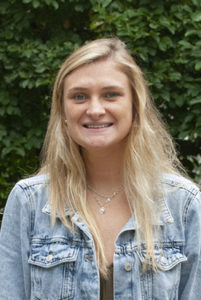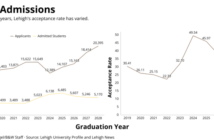
Madison Schmitt
It was a bleak evening in October 2011 as I sat in the passenger seat beside my father. The tears cascading relentlessly down my cheeks were matched with overwhelming nausea permeating throughout my body.
I struggled desperately to assert my focus on objects in the car — the muddy laces of my worn out soccer cleats in the back seat, the pile of empty water bottles under my feet, my trembling hand gripping my father’s, but the flashing police lights prevented me from evading what would soon be a traumatizing memory.
“I only had a glass of wine,” my mother said with eyes glazed back and a hand fixed on her right hip to keep from falling over. The police officer writing up the DUI ticket ignored her like a tired mother might ignore her child’s feeble pleas for a second ice cream cone.
My father and I drove home silently with hands held tight, bracing each other for the adversity we knew lay ahead.
My mother’s battle with alcoholism began when I was in middle school and grew to become the primary source of my family’s suffering throughout my entire high school career. DUIs and medical bills from drunken incidents stacked up, while my two older brothers, my father and I attempted to live a life of normalcy amid the emotional turmoil that surrounded us.
I wanted to hate her, and I acted like I did countless times. If she had already been drinking when I got home from school, I would lock myself in my bedroom and refuse to communicate with anyone until the next day. I only spoke when I wanted to make her feel worthless. Her worst spells, characterized by consecutive days of binge-drinking hard liquor, tumbles down the stairway and endless screaming bouts, finally triggered an ultimatum: either she committed to a rehabilitation facility, or we leave.
The first two 30-day rehabilitation facilities proved ineffective. She called my father every day, begging him to take her home. She attended the sessions she was required to and isolated herself in her designated room the rest of the time. Despite our attempts to encourage and support her, we found ourselves back at square one.
She wasn’t ready to change, and that sentiment was evident in her relapses. Whatever scraps of hope I had left were utterly demolished.
My first year of college offered me the escape I had spent years longing for. I was finally given the opportunity to live a life that wasn’t shackled to my mother’s chaos. During my first semester, I ignored her every attempt at contacting me, avoided listening to her voicemails and focused on generating the exciting college experiences I had always imagined. It felt like a fresh start.
But as the weeks piled up, I ached to hear my mother’s voice. I decided to listen to a week-old voicemail she had left me.
She had called me to tell me that she decided to check herself into a six-month extended rehabilitation facility. She said she was tired of the life she was living. She was tired of hurting her family. Most of all, she was tired of hurting herself.
Although our family and friends spent years trying to hinder her alcohol dependence, I knew that this was the official beginning of her recovery. For the first time, it wasn’t my father, my brothers or myself begging her to commit. She made the decision.
Today, my mother is over two years sober and counting, a feat that I used to believe was impossible for her to reach. She made an absolute commitment to lifelong abstinence and hasn’t looked back since.
I feel blessed to have the best version of my mother back. And while I’ll carry the traumatic memories of my childhood with me forever, I have forgiven her for the pain she caused. Her affliction with the disease, while emotionally draining, afforded me with a unique understanding of alcoholism and the tribulations connected to it.
Alcoholism is a disease, not a choice. I learned that it wasn’t my mother I hated all those years, rather the satanic disease that enslaved her. I learned that her behavior didn’t define who I was, even though it felt like it did at the time. I learned that solid relationships are critical in navigating life’s challenges. Most importantly, I learned that unconditional support is essential, but change must come from within.
Everyone will face adversity in varying degrees at some point in their life. These seemingly impenetrable barriers offer us the greatest lessons. We can either hide from them or grow from them.
Madison Schmitt, ’20, is the deputy sports editor for the Brown and White. She can be reached at [email protected].





Comment policy
Comments posted to The Brown and White website are reviewed by a moderator before being approved. Incendiary speech or harassing language, including comments targeted at individuals, may be deemed unacceptable and not published. Spam and other soliciting will also be declined.
The Brown and White also reserves the right to not publish entirely anonymous comments.
2 Comments
I am pleased to hear of your mothers decision to become sober, a decision I hope she continues to make for her sake and the family’s. Thank you for telling the story, I hope you healing continues.
My father, now deceased, was an alcoholic but thankfully for me did not exhibit many of the behaviors that were so distressing to your family. Until his death at 91, he never chose to stop drinking although others chose to have him cut back.
“Alcoholism is a disease, not a choice.” I don’t have the disease. I have often said to myself that I would not want to drink to the degree that I could not freely enjoy one. Apparently when you become an alcoholic, you loose the ability to freely choose to drink, you demand a drink. But the choice is there before you become an alcoholic. You “Are” or “Aren’t” is a questionable condition, when does choose become addicted? Your mother finally made a choice to attempt to become sober. You and your family could not make that choice, only her choice could be desperate enough to challenge the power of the addiction.
People do not choose to become alcoholics and they can’t choose to stop being alcoholics but they can choose to not becoming one or to not becoming subservient to its demands.
My daughter has lost two friends to drug overdoses in the last six months. One of whom was actively attempting to get clean. Think before you act, the world can be a dangerous place.
Nice post!